| Srl | Item |
| 1 |
ID:
079861
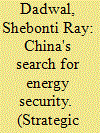

|
|
|
|
|
| Publication |
2007.
|
| Summary/Abstract |
As the world's fastest growing energy consumer, China has attracted enormous attention over the last few years. This paper looks at the factors influencing China's policies and strategies in its search for energy security and examines whether China can be persuaded to adopt a more integrative stance with respect to energy. It argues that China's pursuit of a policy to secure preferential access to oil and gas resources in politically unstable states could lead to heightened competition with other major importing states and to geopolitical tensions. Instead, China needs to work with other consumers and the international community to solve energy-related problems.
|
|
|
|
|
|
|
|
|
|
|
|
|
|
|
|
| 2 |
ID:
079865
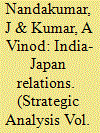

|
|
|
| 3 |
ID:
079862
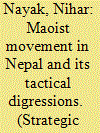

|
|
|
|
|
| Publication |
2007.
|
| Summary/Abstract |
King Gyanendra's takeover of absolute political power in February 2005 paved the way for the Maoists of Nepal and the political parties to fight together for democracy. In signing the 12-point agreement with the Seven Party Alliance (SPA), the Maoists even changed their strategy from a revolutionary agenda to a democratic one. The paper argues that the Maoist departure from the classical resistance model to the path of negotiation was tactical, to overcome the constraints on their way forward. However, the SPA and the Maoists have several issues to settle for making the experiment a success. If this accord fails, Nepal might face a fresh round of conflict and the monarchy might get another chance to dominate the polity.
|
|
|
|
|
|
|
|
|
|
|
|
|
|
|
|
| 4 |
ID:
079864
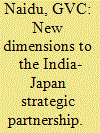

|
|
|
| 5 |
ID:
079860


|
|
|
|
|
| Publication |
2007.
|
| Summary/Abstract |
Today, it is necessary for India to respond to the current crisis of the NPT and weigh its options vis-à-vis the Treaty. This paper is an attempt to explore answers to the question of what ought to be India's policy in the light of the new nuclear reality. It analyses three policy options that India could pursue and concludes that India must strive to join the NPT as a nuclear weapon country, because joining the non-proliferation regime by evading the NPT is likely to prove costly and is also unlikely to remove destabilizing irritants.
|
|
|
|
|
|
|
|
|
|
|
|
|
|
|
|
| 6 |
ID:
079863
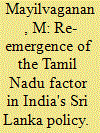

|
|
|
|
|
| Publication |
2007.
|
| Summary/Abstract |
The Tamil minority in Sri Lanka have traditionally exerted a sympathetic pull on their co-ethnics in Tamil Nadu. This has inevitably influenced India's policy towards Sri Lanka. The assassination of Rajiv Gandhi in 1991 changed this pattern and the popular sympathy for Tamil militancy ebbed considerably in its aftermath. However, the spontaneous reactions by the political parties of Tamil Nadu to the Sri Lankan government's indiscriminate air attack on Tamil majority areas since mid-2006 and the flight of refugees to India indicate that Tamil Nadu may have resurfaced as an important factor in India's Sri Lanka policy. For New Delhi, it can neither afford to see the Liberation Tigers of Tamil Eelam (LTTE) strengthen its foothold by taking advantage of influx of refugees, nor can it be a silent spectator to the humanitarian crisis in Sri Lanka as the Government of Sri Lanka appears determined to find a military solution to the ethnic problem. There is, therefore, a need to analyse the re-emergence of the Tamil Nadu factor in the post-Rajiv Gandhi assassination phase
|
|
|
|
|
|
|
|
|
|
|
|
|
|
|
|